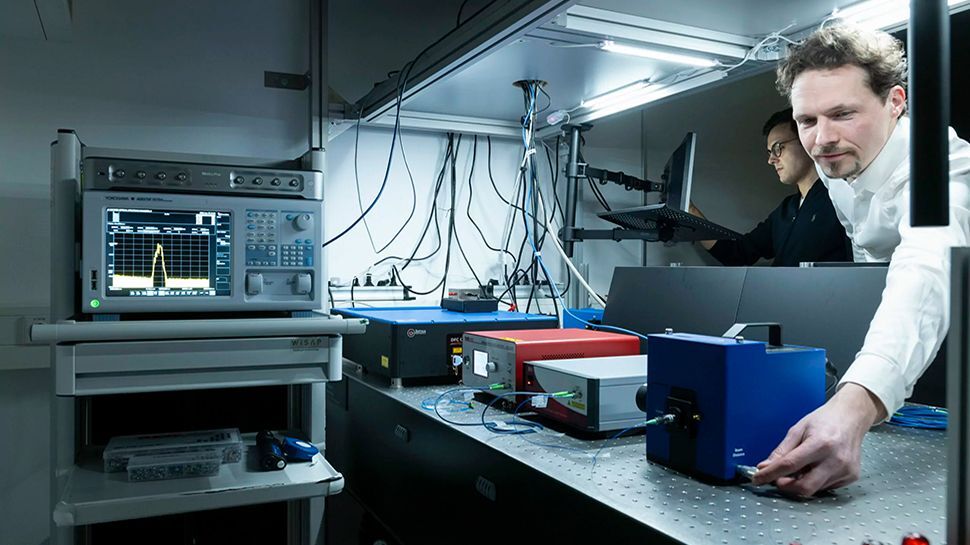Silicon computing is starting to run up against hard limits when it comes to energy usage. Bitcoin mining is currently using 2% of the USA’s energy. Data Centers are projected to be using a third of Ireland’s electricity output by 2026.
However it seems next-generation solutions are on the horizon, and this is one of them. Transitioning computing to energy-efficient new technologies is another front in the war to slow climate change.
The solution is right in front of us. Stop burning fossil fuels. We could do it tomorrow, but we don’t want too bcz it would lower people’s quality of life, and make billionaires less rich, heavy emphasis on the later statement.
Efficiency still either burns less fossil fuels or gets more out of renewables, it helps either way.
Original source (free access) :
https://onlinelibrary.wiley.com/doi/10.1002/advs.202303835
So, if I read it correctly, they do not modify the fiber so the training information would be store in the fiber.
They do not have light that can learn by itself either … instead, what they do is they notice that a very reproducible noise pattern is created and they are training a machine outside of the optical fiber to recognize which part of this noise could be interpreted as information … all of this is in fact very power costly, …and is likely to remain so.
Edit : I removed my last statement because I don’t want to start bickering about sterile nonsense.It’s significantly less compirationally costly however because you only need to train and run a small, linear output transformation rather than a full nonlinear neural network.
all of this is in fact very power costly, … and is likely to remain so.
I’m not sure how you arrived at that conclusion. The direct quotes from the actual researchers say the opposite.
and is likely to remain so.
Well, in fact I don’t care at all for that last statement of mine. So, if this is all you disagree about my reading of the article then it’s fair game for me.
Technobabble detectors reading very high. This article is meaningless.
Technobabble detectors reading very high
Interesting response. Do you have some particular physics qualification that gives you confidence to say this in response to the Physics Professor at Tne Leibniz Institute of Photonic Technology who is making these claims?
Whew, straight in with the authority fallacy! How long did you defend your belief in Santa Claus?
Yes, the idiotic fallacy of giving greater weight to the opinion of an authority at the subject being discussed. It is no match to the logical chad move of giving weight to the opinion of a random internet commentator who claims something is nonsense without giving any reason or explanation why.
While it’s fair to point out I have no reasons myself, you got the fallacy wrong. You didn’t just give greater weight to their position. You hinged your entire position on theirs. You’re defending something you don’t even understand yourself.
Just because an argument uses a fallacy doesn’t make its conclusion incorrect. Otherwise known as the fallacy fallacy.
The person they are referring to most certainly has better knowledge on the subject than you.
You hinged your entire position on theirs.
I did what? That was my first post in this entire thread.
It’s not a fallacy to appeal to an independent intellectual authority. Do you disregard all research papers because they’re tainted by authority? Photonic computing is very real, and an ignorance of it doesn’t make you an expert on the validity of a claim. Perhaps you could try reading more to correct this issue. How long have you worn that fedora without washing it?
Fallacy fallacy.
“You’re throwing a lot of big words at me that I don’t understand, so I’m gonna take it as a sign of disrespect.”
Check it out here: https://www.uni-jena.de/en/all-news/neural-networks-made-of-light
And there is a reference at the end:
B. Fischer, M. Chemnitz, Y. Zhu, N. Perron, P. Roztocki, B. MacLellan, L. Di Lauro, A. Aadhi, C. Rimoldi, T. H. Falk, R. Morandotti: Neuromorphic Computing via Fission-based Broadband Frequency Generation. Adv. Sci. 2023, 10, 2303835. https://doi.org/10.1002/advs.202303835
This magazine has a good impact factor as far as a quick search shows.
Well that’s dramatically better than techradar. It’s hard to believe human beings living regular lives are doing this kind of thing. How did we get here?
It’s hard to believe human beings living regular lives are doing this kind of thing.
What?






